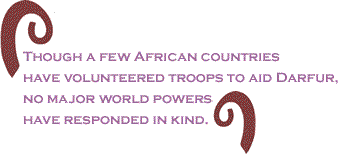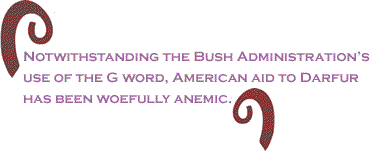
“Genocide is the crime of destroying national,
racial or religious groups. The problem now arises as to whether
it is a crime of only national importance, or a crime in which
international society as such should be vitally interested. Many
reasons speak for the second alternative. It would be impractical
to treat genocide as a national crime, since by its very nature
it is committed by the state or by powerful groups which have
the backing of the state. A state would never prosecute a crime
instigated or backed by itself.” – Raphael Lemkin,
1946 The term genocide did not exist until
the mid-1940s, when Raphael Lemkin, a Polish Jewish lawyer who
fled nazi-occupied Europe
to the United States, invented the word that he hoped would change
the world. Lemkin urged that genocide – taken from the Greek root geno (race or tribe)
and the Latin cide (killing) – be recognized as an
international crime, which countries would be averse to permit
or, even worse, commit.
Lemkin, who lost 49 members of his family in
the Holocaust, convinced United Nations representatives in 1948
to support the Genocide
Convention, the U.N.’s first human rights treaty, which compelled
signatories to “undertake to prevent and punish” genocide.
But since Lemkin’s invention of the G word,
several American Presidents, including Ronald Reagan, George
Bush, Sr. and Bill
Clinton, have refused to use it. Bill Clinton even refused to
characterize the Rwanda massacre as genocide, despite the fact
that the fatal butchering of 800,000 Tutsis and moderate Hutus
represented one of the most intense and atrocious campaigns of
mass murder in the 20th century.
 Recently at the United Nations, President
George W. Bush, in a striking departure from his predecessors’ stance,
including that of his father, used the G word and recognized
the “genocide” occurring
in Darfur, Sudan. Secretary of State Colin Powell also made history
when he delivered a formal finding of genocide to Congress, something
never done by a senior United States official. “When we reviewed
the evidence,” Powell remarked, “we concluded – I concluded – that
genocide has been committed in Darfur and that the government of
Sudan and the Janjaweed bear responsibility and that genocide may
still be occurring.” Recently at the United Nations, President
George W. Bush, in a striking departure from his predecessors’ stance,
including that of his father, used the G word and recognized
the “genocide” occurring
in Darfur, Sudan. Secretary of State Colin Powell also made history
when he delivered a formal finding of genocide to Congress, something
never done by a senior United States official. “When we reviewed
the evidence,” Powell remarked, “we concluded – I concluded – that
genocide has been committed in Darfur and that the government of
Sudan and the Janjaweed bear responsibility and that genocide may
still be occurring.”

 The
Genocide Convention, which prohibits attempts to exterminate “in
whole or in part” national, ethnic or religious groups, was created
to respond precisely to the type of crimes against humanity currently
being perpetrated against Black Darfuris. The
Genocide Convention, which prohibits attempts to exterminate “in
whole or in part” national, ethnic or religious groups, was created
to respond precisely to the type of crimes against humanity currently
being perpetrated against Black Darfuris.
Sudan’s government and its mainly Arab Janjaweed militias are
systematically murdering Darfur’s Black population, killing tens
of thousands and gang raping women and girls.
The underlying source of the conflict – a rivalry over land, water
and other resources between Black farmers and Arab nomads – has
been simmering for years, but erupted last year when groups representing
Black Darfuris initiated an uprising against Sudan’s government. The
Sudanese government responded by arming the mostly Arab Janjaweed
to quell the insurgency. As part of their campaign, which was
supported by bombing raids carried out by the Sudanese air force
on Darfur villages, the Janjaweed murdered, raped and pillaged
Black civilians.
 In September, a 25-year old Black Darfuri
woman painted a personal portrait of the horrors endured by Black
Darfuris
to Amnesty International USA. She said that her village was
attacked by Janjaweed “men on horses and camels” who surrounded
the village at midday, and who were “accompanied by soldiers
of the government.” “Two hours later,” she said, “a plane and
two helicopters flew over the village and shot rockets. The attackers
came into the houses and shot my mother and grandfather, without
any word. The attack lasted for two hours and everything was
burnt down in the village.” In September, a 25-year old Black Darfuri
woman painted a personal portrait of the horrors endured by Black
Darfuris
to Amnesty International USA. She said that her village was
attacked by Janjaweed “men on horses and camels” who surrounded
the village at midday, and who were “accompanied by soldiers
of the government.” “Two hours later,” she said, “a plane and
two helicopters flew over the village and shot rockets. The attackers
came into the houses and shot my mother and grandfather, without
any word. The attack lasted for two hours and everything was
burnt down in the village.”

Tragically, since last year an estimated 70,000
Black Darfuris have died as a result of the rampant violence,
hunger and disease. More
than 2 million Black Darfuris have been displaced, with some 200,000
fleeing to squalid refugee camps in neighboring Chad. The United
Nation’s World Health Organization reported that up to 10,000 Darfuris
are dying each month in these refugee camps. Many of the refugees
recount the raping of women, torching of villages, and calculated
destruction of food supplies and poisoning of water sources by
the Janjaweed.
Notwithstanding the Bush Administration’s
use of the G word, American aid to Darfur has been woefully
anemic. Powell’s
testimony – that “no new action is dictated” by
the genocide determination in Darfur - underscores this point. Signatories
to the Genocide Convention can satisfy their obligations by simply
calling “upon
competent organs of the United Nations” to act or by responding
in any other way that “they consider appropriate.”
 Unfortunately, what signatories have
considered “appropriate” has
simply not addressed Darfur’s greatest need, which is the establishment
of an international peace-keeping coalition. Though a few African
countries, including Rwanda, Nigeria and Tanzania, have volunteered
troops to aid Darfur, no major world powers have responded in
kind. Neither has the United Nations proffered the resources – human,
financial or otherwise – that would be essential to ending this
ethnic cleansing campaign, which promises to claim the lives
of many more Black Darfuris. Unfortunately, what signatories have
considered “appropriate” has
simply not addressed Darfur’s greatest need, which is the establishment
of an international peace-keeping coalition. Though a few African
countries, including Rwanda, Nigeria and Tanzania, have volunteered
troops to aid Darfur, no major world powers have responded in
kind. Neither has the United Nations proffered the resources – human,
financial or otherwise – that would be essential to ending this
ethnic cleansing campaign, which promises to claim the lives
of many more Black Darfuris.
The Bush Administration apparently believes that
it has faithfully discharged its duty under the Genocide Convention
by merely using the G word. But the Bush Administration’s
failure is not that they haven’t accurately identified the genocide
in Darfur. Instead, it is that they, like their predecessors,
have failed to put an end to it.
Ryan Paul Haygood is an attorney in New York
City. |






